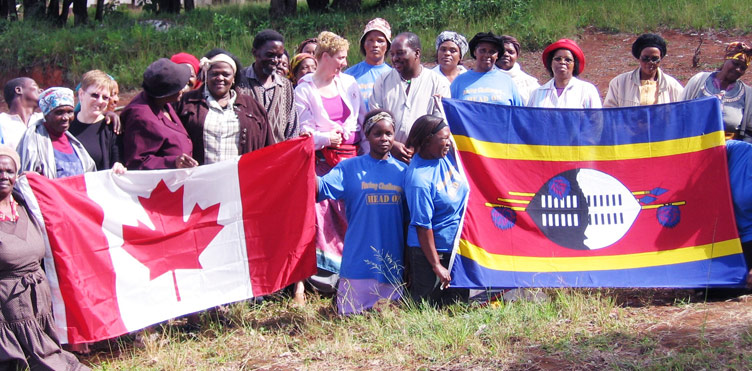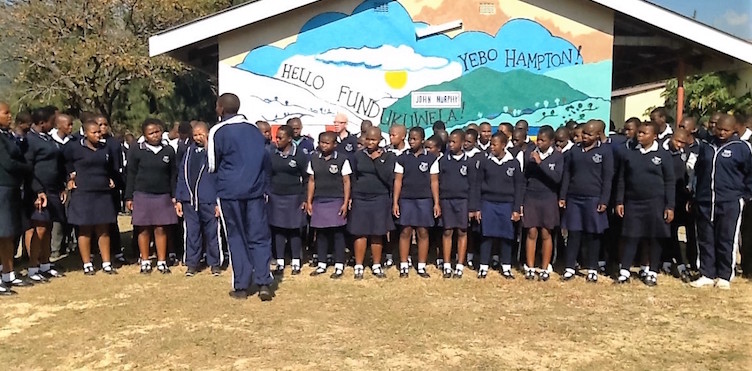
Mark Bettle (BBA’82) still remembers the speech Thandi Nhlengethwa gave more than a decade ago in the library of his hometown high school – frank, stark, heart-wrenching.
Nhlengethwa, managing director of the AIDS Support Centre in Swaziland, came to Hampton High School in 2004 to speak about the ravages the disease was reaping in the small African nation.
With more than 25 per cent of the adult population infected with AIDS, Swaziland has the highest number of instances of infection in the world and the lowest life expectancy, at merely 50 years of age. These startling facts got Bettle's attention, but it was the stories he heard that day that compelled him to act. Stories of a middle generation essentially wiped out by AIDS.
“What that has left is 80-year-old grandmothers taking care of 12 grandchildren in a one-room hut because all their children have died,” he says. "Or 13-year-old girls left to parent a brood of siblings."
Bettle, a business executive with J.D. Irving, Limited, reached out to Nhlengethwa after her speech to find out what he could do to help. They kept in touch by email, and he ruminated on what he had read.
It wasn’t long before Bettle came up with the idea of connecting his community of Hampton, NB, with a similar-sized community in Swaziland – Piggs Peak, a town of about 5,700 in the northeastern corner of the country.
“It is a terrible situation over there," Bettle says. "The poverty, the disease and what people have to live with. If you go there, you see the problems. You can’t come away and not want to help.”
In 2005, Bettle launched the Hampton-Piggs Peak Partnership, a charity with the mission of providing “help, hope and opportunity for a better future...one person at a time.”
Wary of imposing a “North American solution on an African problem,” Bettle instead found ways of aiding and empowering the residents of Piggs Peak. The charity set out to build badly needed school washrooms and began covering the tuition charged to attend high school.
When the partnership began, 18 students were able to go to school. Thanks to the determination of Bettle and dedicated volunteers, and the overwhelming generosity of the people of Hampton, more than 1,000 youth in Piggs Peak have now been able to go to high school.
According to Bettle, the act of merely going to school every day is a breakthrough for this community.
“They are less likely to be sexually active when they go to school, so you check one big box off for how you prevent the spread of AIDS,” he says. “And, especially for girls, going to school provides them with confidence and a boost to their self-esteem.”
The Hampton-Piggs Peak Partnership has drawn the notice of Stephen Lewis, former UN special envoy for HIV/AIDS in Africa. “The partnership between the Town of Hampton and Piggs Peak in Swaziland is exactly the kind of response that needs to happen to beat the pandemic,” says Lewis. “You can’t imagine what it means to a community in Africa to know that they have the support and assistance of Canadians.” (Source: hamptonpiggspeak.com)
Some of the major projects undertaken by the Hampton-Piggs Peak Partnership include, constructing girls' latrines at the local high school, establishing the grandmother partnership program, and providing financing for agriculture and irrigation equipment.
A documentary on the Hampton-Piggs Peak Partnership showcases the communities and some of the work that the partnership has undertaken.

Bettle credits the business education he received at UNB Saint John with his ability to make the partnership work.
“What UNB did is provide the basis for my future career in business,” he says. “What my career has done is give me the wherewithal and the tools to create something like this.”
Borrowing a word from the business world, Bettle reveals that he’d like to “franchise” the model he has created with the Hampton-Piggs Peak Partnership so that other communities can forge similar partnerships to provide aid.
“We have a vision here," says Bettle. "Now, our goal is to convey the need so that they have the same inspiration or motivation compelling them to help too.”